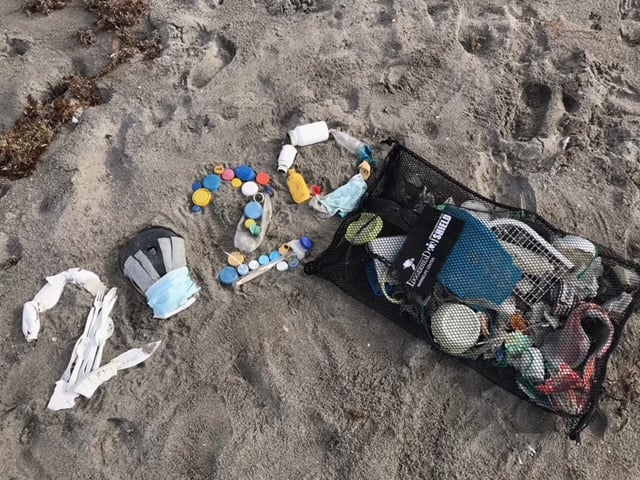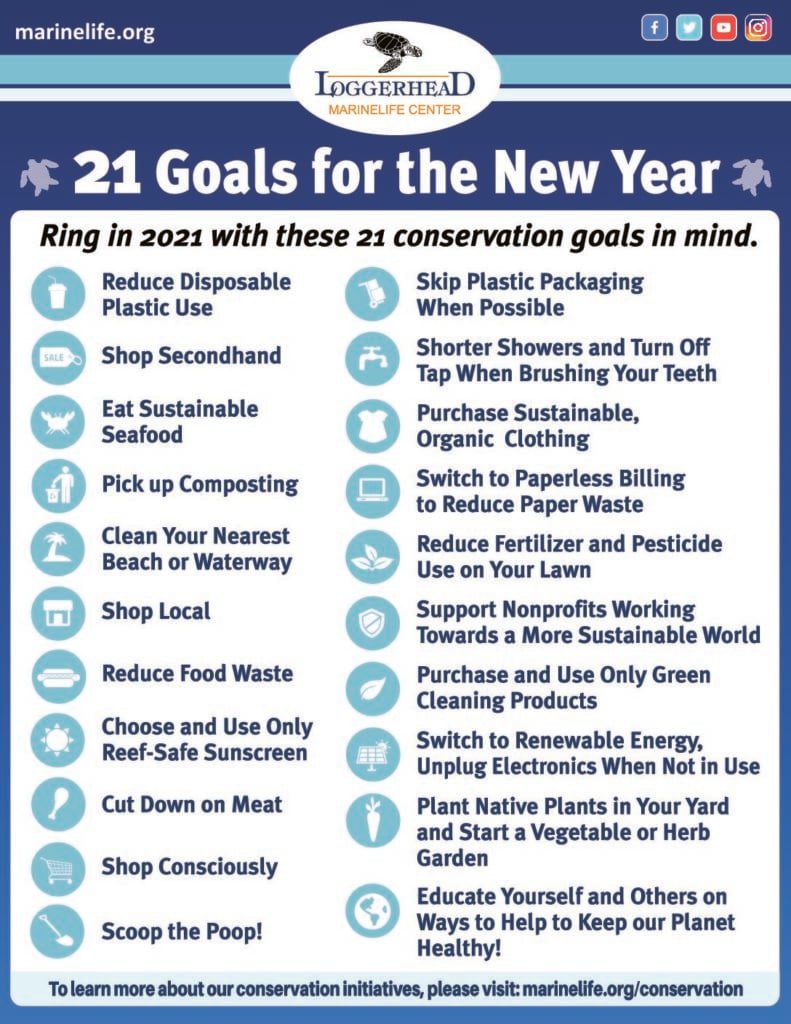
2020 will be remembered as a standalone year in history textbooks. It’s one that we all know brought on COVID-19, racial reco and a harrowing presidential election. But there also were many things to write home about: stay-at-home orders led people to adopt one or more dogs or cats between March and June, carbon emissions dropped by 7% from 2019, and in our case – it upped the ante for cleaning our beaches and oceans.
While we hope 2021 is a little easier on us, we should continue to aim high to keep an upward trend! Ring in 2021 with these 21 conservation goals in mind.
Goals for 2021
- Reduce Disposable Plastic Use.
Did you know, in the US alone an average of 1.6 billion disposable pens, over 1 billion toothbrushes, and 40 billion plastic utensils are thrown away each year? Use LMC’s at-home plastic audit to identify the sneaky disposable plastic items in your life and some sustainable alternatives to purchase instead!
- Shop Secondhand
By giving clothing, appliances, furniture, and other items a second life, you are helping to curb “fast fashion,” and helping to conserve the environment! By doing so, individuals not only help prevent excess clothing from being produced, but can also help prevent unnecessary carbon emissions generated by clothing production.
- Eat Sustainable Seafood
Eating sustainable seafood is the best way to ensure there will be plenty of fish in the sea for generations to come! Stay informed on what seafood options are the most sustainable on Seafoodwatch.org.
- Pick up Composting
Composting food scraps is one of the best ways individuals can reduce their carbon footprint and help curb climate change.
- Clean your nearest beach or waterway
It’s estimated that over 8.5 million metric tons of plastic enter the ocean each year, and once this plastic enters the marine environment it will never go away. Instead, it breaks down over time into smaller and smaller pieces but will remain plastic. By directly removing this plastic from the marine environment, millions of other pieces are prevented as well! Shop Local
By supporting local, sustainable businesses, you can help reduce carbon emissions and have a say in where your products come from.
6. Skip Plastic Packaging When Possible
You can help reduce the amount of plastic waste produced each year by opting for items packed in alternative materials like cardboard, glass, metal, bamboo, etc.
7. Skip Plastic Packaging When Possible
You can help reduce the amount of plastic waste produced each year by opting for items packed in alternative materials like cardboard, glass, metal, bamboo, etc.
8. Take Shorter Showers and Turn off the Tap When Brushing Your Teeth
Be conscious of your water usage and reduce where you can! Take shorter showers, use leftover drinking water to water plants, and turn off the tap when brushing your teeth.
- Reduce Food Waste
Only buy what you need when grocery shopping to eliminate food waste!
- Choose and use ONLY reef-safe sunscreen in 2021
Most sunscreen brands labeled “reef safe” still contain ingredients harmful to coral reef ecosystems. Check the ingredient list for the following chemicals that are harmful to coral reefs; Oxybenzone (Benzophenone-3, BP-3), avobenzone, para-aminobenzoic acid (PABA), octinoxate (Ethylhexyl methoxycinnamate), octocrylene, Homosalate, (Methyl/Ethyl/Propyl/Butyl/Benzyl)parabenPropyl) paraben, Triclosan, 4-methylbenzylidene camphor (4MBC, Enzacamene).
- Cut Down on Meat
Reducing meat consumption will reduce methane emissions and space necessary for livestock.
- Purchase Sustainable, Organic Clothing
Did you know, most of our clothing is actually made of microfibers of plastic? Instead of clothes made of synthetic materials like polyester blends, shop for materials like cotton, linen, bamboo, or Tencel.
- Switch to Paperless Billing to Reduce Paper Waste
Save resources by switching to online billing and prevent unnecessary paper waste!
- Reduce Fertilizer and Pesticide Use on Your Lawn
Pesticides and fertilizers can have a negative impact on wildlife, and when it rains, can wash directly into the nearest waterway through stormwater runoff. These fertilizers and pesticides can cause harmful algal blooms in fresh and marine environments.
- Shop Consciously
Choose items and brands that prioritize sustainably made and ethically sourced products, sustainable packaging, and cruelty-free brands.
- Scoop the Poop!
Pet waste is full of nutrients like nitrogen and phosphorus – both of which can contribute to toxic algal blooms in lakes and the ocean when found in high concentrations. Be sure to pick up after your pets to reduce the amount of nutrients entering freshwater and marine environments.
- Support Nonprofit Organizations Working Towards a More Sustainable World
Many nonprofit organizations, both locally and globally, are working to keep our oceans and environment clean, safe, and healthy. Consider supporting these efforts through donations or by volunteering your time!
- Purchase and Use Only Green Cleaning Products
Chemicals in cleaning products that go down the drain eventually end up in our oceans and can be harmful to ocean ecosystems. Do what’s best for your health and our planet and use only green products!
- Switch to Renewable Energy and Unplug Electronics When Not in Use
Cut back on carbon emissions and switch to renewable energy sources like solar options! Also be sure to unplug all electronics when not in use and turn off lights when you leave the room.
- Plant Native Plants in Your Lawn and Start a Vegetable or Herb Garden
By planting native plants in your green spaces, you can help keep bees and other local pollinators happy and healthy! Native plants can also help slow stormwater runoff.
- Educate Yourself and Others on Ways to Help Keep our Planet Healthy!
The best way to ensure you are doing your best for our planet is to stay informed and educate others when you learn something new or discover a new sustainable product you are proud of.

